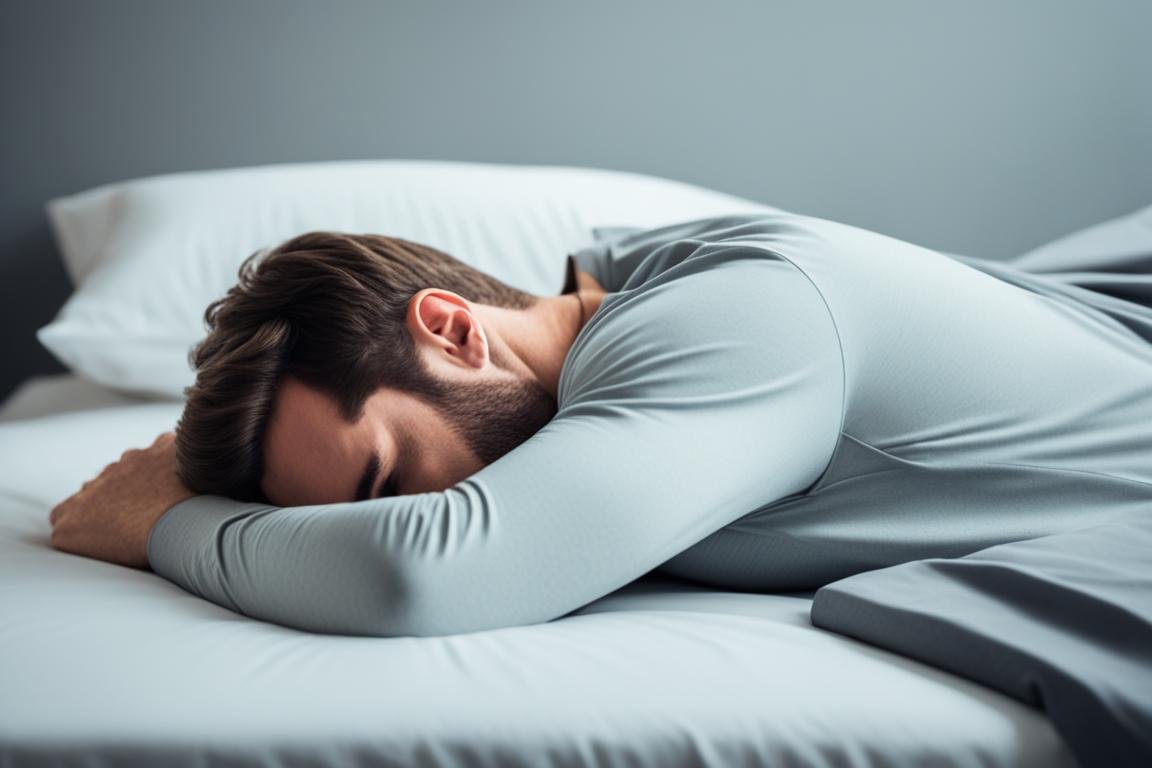Waking up with back pain stirs frustration. It’s not rare to feel upper back pain after sleeping. It shows a change in sleep habits might be needed. Strengthening back muscles is also key. In some cases, hidden issues could be causing this discomfort.
Several things can cause upper back pain while sleeping or when you wake up. Your sleeping posture is a big factor. Tension in your muscles from stress can also play a role. Being overweight might lead to upper back pain if your sleep position strains your back. A bad mattress can be another culprit.
Most upper back pain gets better with some rest and care. But you should look into it further if it keeps coming back, like after an injury or if you have certain health conditions. It’s a bummer when upper back pain wakes you at night. Yet, tweaking your sleep setup can help a lot. This means sleeping in ways that are better for your back. It can make you feel better and more rested when you wake up.
Key Takeaways
- Upper back pain after sleeping can be caused by factors like poor sleeping posture, stress and muscle tension, being overweight, and sleeping on an unsupportive mattress.
- Seeking professional help is recommended for underlying conditions like accidents, compression fractures, or arthritis that may be contributing to upper back pain.
- Proper sleep positions, such as side or back sleeping with pillow support, can help alleviate upper back discomfort.
- Engaging in stretching and strengthening exercises, as well as stress management techniques, can aid in relieving upper back pain.
- Investing in an ergonomic mattress and pillow can significantly improve sleep quality and reduce upper back soreness.
Understanding the Anatomy of the Upper Back
It’s good to know about the upper back before we talk about its pain. The upper back is also called the thoracic region. It has twelve vertebrae. These are attached to the rib cage and help hold up your upper body. The muscles, ligaments, and tendons in this area all help you move and stay firm.
The Thoracic Spine and Surrounding Muscles
The thoracic spine is in the middle of your back. It’s between your neck and lower back. There are twelve vertebrae here, from T1 to T12. These bones and the surrounding muscles like the trapezius and latissimus dorsi help keep your upper back strong and flexible.
Importance of Proper Spinal Alignment
Keeping the proper spinal alignment is key for a healthy upper back and good sleep. The thoracic spine curves naturally. This curve spreads weight and stress over your vertebrae. But, things like bad posture or body shape issues can cause upper back pain.
Common Causes of Upper Back Soreness After Sleeping
Sleeping the wrong way can hurt your upper back. This happens if you sleep on your stomach or your pillow doesn’t support you well. Your upper back muscles and joints may hurt in the morning.
Causes Distribution:
Percentage:
Poor Sleep Posture
Turning your spine’s natural curve flat, or adding pressure to the upper back, can make it ache in the morning. It’s key to find and stop these bad sleep positions to avoid upper back pain.
Muscle Imbalances and Tension
When your chest, shoulders, and upper back muscles are out of balance, your posture may suffer. This can stress your upper back when you sleep, causing tightness and discomfort. Even your emotional stress can add to this.
Underlying Spinal Conditions
Spinal issues like osteoarthritis, herniated discs, or spinal stenosis can make your upper back ache more after sleeping. This is because you move less when you sleep, making your back more inflamed. Such problems often need a doctor’s care.
| Causes Distribution | Percentage |
|---|---|
| Poor Sleep Posture | X% |
| Muscle Imbalances | X% |
| Spinal Conditions | X% |
| Stress and Tension | X% |
upper back soreness after sleeping
Identifying Bad Sleep Positions
Sleeping on your stomach or with the wrong pillow can hurt your upper back. It’s key to spot and steer clear of poor sleep positions. These hurt the spine’s natural curve or stress the upper back. Choosing the right sleep position keeps your spine straight. This is a big step in stopping upper back pain.
Evaluating Mattress and Pillow Support
Making sure your mattress and pillow give enough support is vital. An old mattress or the wrong pillow height can also cause upper back pain. Pick a mattress and pillow that fit your body well to keep your spine in line. This can make your sleep better and reduce upper back discomfort.
Alleviating Upper Back Pain After Waking Up
Waking up with upper back pain is not fun. But, there are steps you can take to feel better. Try doing stretches and exercises that focus on your upper body. Also, learn about stress management techniques to reduce pain and feel healthier overall.
Stretching and Strengthening Exercises
Stretching and exercising often can reduce upper back pain. Try simple moves that work your upper back, shoulders, and chest. For instance, shoulder rolls and Cat-Cow poses are good choices. They will stretch your back and help lessen pain.
Doing yoga or going for a swim is also great. It makes your core stronger, which supports your back. Remember, doing these things regularly is important.
Stress Management Techniques
Physical stress can turn into muscle tightness in your upper back. This might get worse when you sleep. To fight this, try stress management techniques. They can make your upper back muscles looser and make you feel calm. Techniques like meditation or deep breathing can really help.
There are other ways to feel better, too. Things like dry needling or working with a therapist can help a lot. They focus on fixing what’s actually causing your pain. This way, you might find that you wake up pain-free.
Preventing Upper Back Discomfort During Sleep
To avoid back pain when you sleep, staying healthy is important. Exercise helps a lot. It makes your back stronger and keeps you at a healthy weight.
Make your bedroom good for sleep. This means having the right mattress and pillows. Get a medium-firm mattress and pillows that keep your spine straight.
Also, keep your room cool, dark, and quiet. This helps you sleep without being disturbed.
By being healthy and making your bedroom sleep-friendly, you’ll avoid back aches. You’ll wake up feeling great every day.
When to Seek Professional Care
If upper back pain lasts more than a few days, see a professional. A physiotherapist will check you and find the cause. Then, they will give you a care plan just for you.
Persistent or Severe Pain
Severe or long-lasting pain might need special help. A physiotherapist or a chiropractor can help. They might use manual therapy, special exercises, or dry needling to help you feel better.
Physiotherapy and Chiropractic Treatment Options
Physical therapists and chiropractors can help a lot with upper back pain. They can find out what’s wrong and make a plan for you. This plan might include special exercises and ways to change your life for the better.
Ergonomic Solutions for Better Sleep
Getting the right mattress and pillow helps a lot. It beats upper back discomfort. The best bedding keeps your spine in line. That stops upper back pain and makes sleep better.
Choosing the Right Mattress and Pillow
A good mattress and pillow really matter. They must pad and line up your upper back nicely. A mattress that hugs your spine’s curves lessens pain points. It also makes sure your spine is in a good shape.
A pillow that backs your neck and head right is key, too. It helps your body stay in the best pose. This cuts upper back aches.
Adjustable Beds and Supportive Accessories
Adjustable beds and extras can make sleep even better. They ease your upper back. Adjustable beds let you find the perfect head and body tilt.
Adding extras like lumbar rolls or body pillows helps. They keep your spine set right. This means a sleep that’s more comfy.
Sleep Positions for Upper Back Relief
Having a good night’s sleep is super important for your health. How you position yourself when sleep really matters. It can help a lot with upper back pain. The ideal sleep position supports your spinal cord and keeps your spine’s natural curve.
Side Sleeping with Proper Alignment
Side sleeping is highly recommended for easing upper back pain. Make sure your spine stays straight by putting a pillow between your knees. This keeps your spine’s curve normal and eases pressure off your upper back muscles.
Back Sleeping with Pillow Support
Back sleeping is also good for upper back pain. Lying on your back with a small pillow under your knees helps keep your spine straight. It also lessens the pressure on your upper back. A pillow that supports your neck curve can lower the stress even more.
Don’t sleep on your stomach as it can make upper back and neck issues worse. Choosing the right sleep positions for upper back is key. It helps you reduce pain and sleep well.
Conclusion
Upper back pain
after sleeping can mess up your day. By knowing what causes it, doing some things to prevent it, and getting help when needed, you can feel better. It’s important to live healthily, set up your bedroom to help you sleep, and choose good ways to lie down. This stops your back from hurting and makes you wake up feeling good.
Looking at why your upper back hurts, like not lying the right way, having weak muscles, and having spine problems, can help. Try to use things that are good for your body, like the best mattress and pillow. Sometimes, talking to people who know about health can be a big help.
Putting your sleep first and changing some things about how you sleep can stop
upper back soreness
. This way, you can sleep better and feel great in the morning. Doing these things every day helps you start your day cheering and full of energy.




